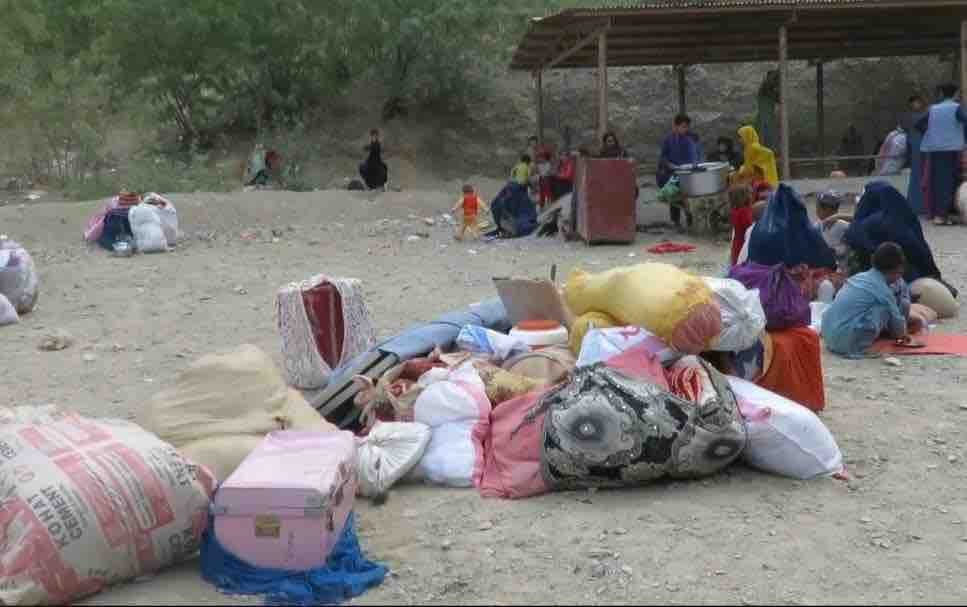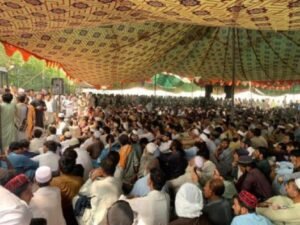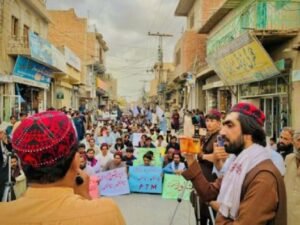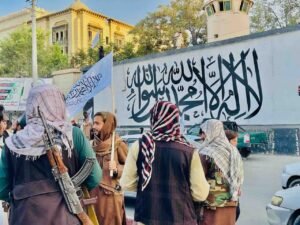Crisis at the Crossroads: Afghan Refugee Challenges, Diplomatic Critiques, and Implications of Forced Return

A returnee family from Pakistan on near Torkham crossing on the side of Afghanistan. Photo: @private
By Ilhamuddin Afghan
The conditions facing Afghan refugees living in neighboring countries, especially Pakistan, have been becoming worse for a while now. If undocumented refugees do not leave Pakistan by the end of October as threatened, they risk forcible deportation. Furthermore, officials from Pakistan have hinted that Afghan refugees who disobey could lose their employment and property.
Alarming allegations suggest that Pakistani security forces have imprisoned and detained Afghan refugees after brutally treating them up. Those who were judged cooperative have occasionally been sent back to Afghanistan against their will. Even some Taliban de facto government officials have criticized the actions of Pakistani security personnel and their choice to forcibly remove Afghans from their homes.
Speaking at a meeting in Kabul, Sher Mohammad Abbas Stanakzai, the Political Deputy of the Taliban’s Ministry of Foreign Affairs, emphasized the importance of Afghan refugees in Pakistan. “Afghan refugees in Iran and Pakistan are a hot topic these days. Our Muslim brothers from Pakistan have supported us throughout history. There reside our five million Afghan refugees. Every family has given a martyr to protect Afghanistan’s independence. If our Mujahidin had not fought, Gwadar and Karachi would be under Russian invasion,” Stanikzai stated.
“We extend an invitation for these refugees to return to their homeland. Thank God, Afghanistan is now secure and has employment opportunities.” Stanikzai cautioned against seeking refuge in other countries, stressing that “there is no peace in neighboring Pakistan. There is neither political nor economic or security stability in Pakistan,” He warned.
During that same meeting, Mullah Yaqoob, the Taliban government’s Minister of Defence, voiced his doubts about the possibility of good relations with Pakistan in light of the treatment of Afghan refugees by Pakistani authorities.
Critical Voices on Afghan Refugees
Many former leaders and officials from Afghanistan have criticized Pakistan’s actions. Pakistan’s activities have been denounced by Nader Naderi, the former head of Afghanistan’s Administrative Reform Commission, who said that they violated the Geneva Convention on Refugees. Naderi stated on his X, “The Pakistani military leaders and their politics are to blame for the instability in Pakistan.”
Masoom Stanakzai, the former Head of National Security and Minister of Defence in the former Republic bemoaned the lack of attention being paid to the situation of Afghan refugees in Pakistan and highlighted the disparity in attention that occurs when human rights are abused. “There’s no connection between terrorism and refugees.” According to Stanikzai, “Terrorism is the result of Pakistan’s past mistakes that it is currently experiencing.”
In the midst of this, Afghan politician Hanif Atmar, who spearheads the “Peace and Justice” party, denounced Pakistan for limiting the life cycle of Afghan refugees, calling it a violation of international agreements as well as Islamic and neighborhood values.
Officials in the Taliban de facto government have made emotional appeals, but it is unclear whether these feelings can excuse them from their duties.
To address this issue, Muhammad Salim, a law graduate, has recommended that the Taliban government not engage in diplomatic relations with Pakistan. Taliban should close Pakistan’s embassy in Kabul, said Salim. A university professor, who wished to remain anonymous, asserted that the Taliban could have lodged complaints with the United Nations and human rights organizations against Pakistan’s actions had they been recognized internationally.
Challenges and Hurdles for Afghan Returnees
The Taliban claimed that Afghan refugee organizations were providing less assistance. According to the Afghan Ministry of Refugees and Repatriation (MoRR), it will push humanitarian organizations to help those who are returning home.
While a joint committee has been established at the Taliban de facto government level to explore avenues of assistance for returnees, it is evident that these actions alone will neither resolve the challenges faced by Afghan refugees nor alleviate the responsibility resting on the shoulders of the Taliban.
After coming to Afghanistan, the returnees have faced numerous challenges and difficulties, such as problems obtaining legal documentation, misplaced possessions, and a lack of suitable accommodation. Furthermore, Afghanistan has significant challenges due to the widespread problem of unemployment.
“I spent 20 years in Pakistan, and no one inquired about my documentation,” claimed Mohammad Yusuf, an Afghan who had returned from Pakistan. “But when I was arrested, I was taken to Torkham border and deported to Afghanistan.”
The ongoing exodus of Afghans, especially the youth, in search of opportunities elsewhere worsens the situation. Although the Taliban claims to have brought security to Afghanistan, many Afghans’ fundamental rights are being infringed, and the way they are treated under their control has cast doubt on the Taliban’s ability to run a responsible administration.
This has led to a scenario where Afghans living abroad refuse to return voluntarily under the existing circumstances, and those who are inside would jump at the chance to flee if it presented itself. Many Afghans are still leaving their country in search of a brighter future due to unemployment, a lack of job prospects, and security concerns.
Ilhamuddin Afghan is a university professor based in Afghanistan.
Note: The contents of the article are of sole responsibility of the author. Afghan Diaspora Network will not be responsible for any inaccurate or incorrect statement in the articles.





